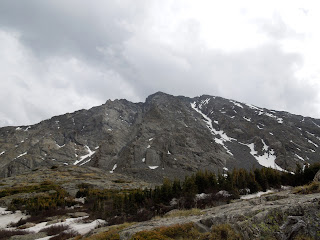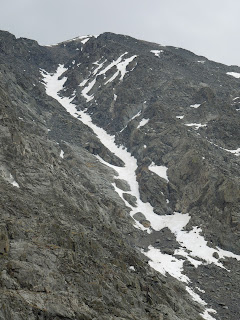It’s difficult to explain to someone unfamiliar with the climbing mentality why one might choose take on a difficult route completely on their
own. Even with the outdoors/action
sports community the ‘never go alone’ mantra is bleated endlessly as the first
and foremost rule of the backcountry.
I’ve read a bazillion debates online about the risks of solo-missions,
and they have all been repeated a million and a half times, so I will not.
Not everyone who goes backcountry skiing is a
mountaineer. However, in my
opinion, every real mountaineer is an adventurer first, and the only rule of
adventure is that there are no rules and no guarantees. There is no partner, no peace of
equipment, and no amount of experience that can guarantee your safety.
Security is an illusion! You
can do everything correctly, follow every rule, and even be in what you think
is a safe place and disaster can still strike. This is not the law of the mountains, but instead is natural
law. Human society endlessly
strives to erase this obvious fact through our norms, but it only can be temporarily
hidden. Reality has a nasty habit
of ripping this charade to shreds and sucker-punching the unaware in the face.
Back to my story, my university schoolwork was finished but I
still had a week of time to kill before graduation. I had been running and gym-climbing in preparation for a
Baker climb, so it seemed like I should head up and spend some time training at
high-altitude with skis and pack on my back. So I threw my gear in my CRV and headed out of Denver sunday
night to see how many mountains I could climb before exhaustion overtook me.
My initial plan was to ski a 13er, a 14er, and then climb
another 13er in three different Colorado ranges in three consecutive days. I ended up deciding to save the last
climb for a different day due to symptoms of altitude sickness.
I spend Sunday night in my bivy sack camped outside of my car
on top of Loveland Pass. A lot
more trucks go over that pass at night then I expected. That morning, I headed up the SE ridge
towards the summit of one of the easiest 13ers in Colorado, Mt. Sniktau. The summit is an easy objective from
the pass, but the NE face is also steep, ascetic, and very visible from
I-70. I had always wanted to ski
this face but it is seldom explored due to avalanche conditions, and thus I
decided it would be a great warm up.
 At the top the snow was getting soft rapidly, and I began to
punch through. But because this
snow received direct sunlight all day I decided that this was not a fair
assessment of the snow on the NE face.
The way down that I saw was not steep so it would not be a risk for
wet-slides. However, it was
necessary to take care traversing the steeper slopes near the top in order to
make sure that one did not get swept off the steep slope into the scree
field. I actually broke off some
tiny wet slabs in my attempt.
At the top the snow was getting soft rapidly, and I began to
punch through. But because this
snow received direct sunlight all day I decided that this was not a fair
assessment of the snow on the NE face.
The way down that I saw was not steep so it would not be a risk for
wet-slides. However, it was
necessary to take care traversing the steeper slopes near the top in order to
make sure that one did not get swept off the steep slope into the scree
field. I actually broke off some
tiny wet slabs in my attempt. I reached the summit at about 10 30 and the day was already
warm. There is almost no snow left
in Colorado except on steep, shaded, NE aspects. However, I was able to see snow down to the lake below the
face, however, the descent required that I take my skis off about 4 times for
around 1500 ft of vertical.
I reached the summit at about 10 30 and the day was already
warm. There is almost no snow left
in Colorado except on steep, shaded, NE aspects. However, I was able to see snow down to the lake below the
face, however, the descent required that I take my skis off about 4 times for
around 1500 ft of vertical.
When I reached the bottom of the lake, I looked up at the NE
face proper and realized that it was holding more snow than I thought. Not only that but the snow here was
much firmer despite the fact that it was after 11 30. I decided that it would be both safe and worth it to hike up
the face and get another run in on steeper terrain. The sun had already stopped shining on the NE face for the
day and the snow continued to support my boots so I was able to jet up to where
the snow ended at just below 13,0000 ft very quickly. However, the clouds were darkening to the E and S, so I
wanted to get off high places sooner rather than later.
The terrain was consistently steep with an interesting
topography. The snow was just a
few minutes past the perfect point in its transition cycle and yielded smooth
buttery turns.
Smashburger in
Dillon was a worthy reward. Then I drove to Breckenridge and continued S on 9 to the
base of Mt. Quandary. It rained the
whole night through, but I spent the night warm and dry in my bivy sack. I suppose I could have slept in my car.
I was woken up the next morning by the sound of another
vehicle arriving and several older dudes gathering their gear. I got out of my bivy and began to pack
up my things. The other party left
before me, but their objective had a longer approach. Still I left my camp much later than I had planned the night
before. The rain had sapped my
motivation, but hearing from this party about tracks they had recently observed
helped reassure me that I would be able to find something to ski. My desired goal would be the North
Couloir on Mt. Quandary, also known as the Quandary Couloir.
Quandary’s East Ridge is an easy hike and safe descent in
Winter, and the Cristo Couloir is the classic more challenging descent, but
neither one of those routes were holding a cm of snow, after all this was the
non-winter of 2012. The North
Couloir is the most challenging snow climb on Quandary and the most technical
descent. Most climbers and skiers
seeking a challenge choose the Cristo Couloir. The Quandary Couloir is supposedly somewhat comparable to
the Dead Dog on Torrey’s in terms of width, length, difficulty, and exposure. The North Couloir is rated on the
Dawson Danger Scale is rated at about D11,R2, G2. I feel that conditions could warrant a possible R3 rating,
but the route is short, definite G2.
Sony DSC-HX200V 18.2MP Digital Camera with 30x Optical Zoom - Black - (Google Affiliate Ad)Canon T3i 18.0MP Digital SLR Camera - Body Only - Digital SLR Cameras (Google Affiliate Ad)
More on the conquest of this objective in the next post...












No comments:
Post a Comment